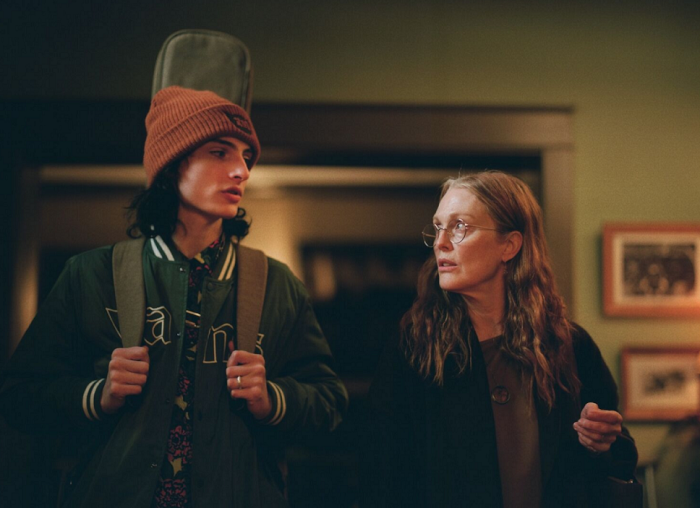By Petr Navovy | Film | January 30, 2023

Before sitting down to write a review, I always quickly hop onto IMDb to refresh myself on the basic facts about the film I’m writing about: Key cast members, release details, running time—that kind of thing. While doing so for Jesse Eisenberg’s feature directorial debut, When You Finish Saving the World, I was gobsmacked to find that the film was apparently only eighty-eight minutes long. ‘That can’t be right!’, I thought to myself in response, brows furrowing and mouth twisting, ‘That was at least two hours, surely! There’s absolutely no way that that was less than ninety minutes long.’
That’s the point at which we’d smash cut to an It’s Always Sunny In Philadelphia-style title card.
Anyway, if that doesn’t provide a clear enough clue of where I’m going with things I might as well just come out with it bluntly: When You Finish Saving the World is not good. It’s not terrible, but I felt every one of its eighty-eight minutes keenly, struggling the entire time to get invested in any part of its meandering story or in any one of its unengaging characters. To be perfectly frank, I think the only reason I made it to the end is thanks to some vague hope that the film would take a turn, that it would somehow justify its own existence. It never did.
When You Finish Saving the World is based on Eisenberg’s 2020 audio-only drama of the same name. In 2021 that production won the Audie Award for best ‘Original Work’. Now, I’ve never heard of the Audie Awards before this, but as I don’t really have any awareness of that side of the industry, that probably says more about me than anything else. The point is, somebody at some point thought this was a good story. In the interests of fairness, let’s assume that that recognition was deserved. What that leaves us with is a stark illustration of how difficult and fraught the adaptation process can be, even when you have key talent working behind the scenes throughout and shepherding things along.
But let’s take a step back. The story here, such as it is, is centered around the relationship between Evelyn (Julianne Moore) and her son, Ziggy (Finn Wolfhard). Evelyn, a serious and highly-strung individual, grew up an activist and now runs a shelter for survivors of domestic abuse. Ziggy shares some of his mother’s more neurotic traits, yet despite that, there is a gulf between them, exacerbated by generational drift and the material circumstances that come with it. The adolescent Ziggy is a successful online streamer, performing original acoustic folk-rock material to thousands of fans from all over the world. Aggressively upper middle class, the family dynamic includes a dad (Jay O. Sanders), who is mostly there to be exasperated by his wife and son’s nonsense.
Over the course of those oh-so-long eighty-eight minutes, a confused plot unfolds in which Evelyn tries to guide the son of one of the women at her shelter towards what she considers a better life, while Ziggy makes attempts at becoming more politically savvy in order to get closer to a girl he has a crush on at school. When You Finish Saving the World tries to make a number of points about (I think!) privilege, family, generational divide, and geopolitics, yet not one of them ever really hits home. I’m not sure how a film’s themes can be hamfisted and sledgehammer-subtle, yet somehow still vague, but they’ve managed it here.
There are a few attempts at some distinctive shots here and there, but the filmmaking remains mostly anonymous, no sense of cohesive style evident apart from some instances of unintentionally jarring editing. The awkward writing present throughout could be attributed to efforts at emulating the way teenagers communicate, but that is a tricky high-wire act to walk, and this film does not manage it. A mismatched soundtrack is meant to (again, I (em)think!) come across as dissonant, but the goal or thematic purpose remains unclear. It’s difficult, too, to assess Moore and Wolfhard’s (or anyone’s) performances in this context, as so many of the movie’s basic elements are fighting against each other and preventing me from getting closer to the material.
While the vast majority of the film is rapidly fading from memory now, I do keep coming back to one thing: Ziggy’s music. The thing that apparently has thousands of people from all over the world hooked on his livestreams. The music is terrible, and for the life of me I can’t figure out whether that’s meant to be intentional or not. While watching the film I oscillated wildly between being convinced of each position, before finally settling on complete indifference. A fitting metaphor I suppose.